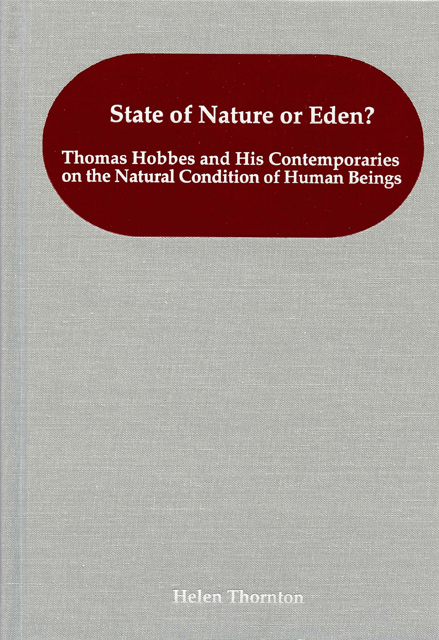 State of Nature or Eden?
State of Nature or Eden? Chapter Three - The War of All against All
Published online by Cambridge University Press: 21 June 2023
Summary
‘Cain rose up against Abel his brother, and slew him …’ (Genesis IV.8)
Hobbes thought that human beings who lived in the state of nature, or a condition which lacked a common power to arbitrate their disputes, would naturally be in a condition of war. In the Latin edition of Leviathan he cited the example of Cain and Abel in defense of this claim, with the following statement: ‘But someone may say: there has never been a war of all against all. What! Did not Cain out of envy kill his brother Abel, a crime so great he would not have dared it if there had at that time been a common power which could have punished him?’ But, as Edwin Curley has noted, most seventeenth century English men would have understood that Cain was living under a power able to punish him—that power was God. And further that God did punish Cain immediately by cursing him from the earth, by making him a vagabond, and by marking him so that he would not be killed by others.
This use of the account of the murder of Abel by Cain did not appear in the English edition of Leviathan, where Hobbes instead referred to ‘the savage people in many places of America’. Nor did it appear in the earlier versions of Hobbes’ political theory. So why did Hobbes refer to it in the Latin Leviathan? Quentin Skinner may provide the answer to this question, with his suggestion that Hobbes changed the presentation of his political theory, as he began to doubt the power of reason alone to persuade. According to Skinner, beginning with the 1647 edition of De Cive, Hobbes moved further towards the realization that reason needed to be combined with rhetoric for his argument to have any power over the minds of his readers. For Skinner, this culminated in the Latin version of Leviathan, which he has described as ‘arguably the most rhetorical of Hobbes’s works’. But if Skinner’s claim is correct, and Hobbes’ citation of Cain and Abel was an example of such rhetoric, then what purpose did this example serve, especially as many of Hobbes’ readers would not have believed that there was no power able to punish Cain?
- Type
- Chapter
- Information
- State of Nature or Eden?Thomas Hobbes and his Contemporaries on the Natural Condition of Human Beings, pp. 70 - 100Publisher: Boydell & BrewerPrint publication year: 2005
